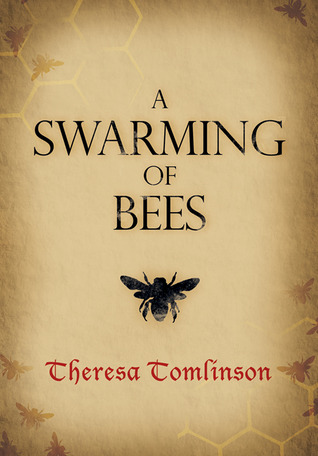The author of this book has kindly offered one copy of ‘Queen of a Distant Hive’. To be in with a chance to win, just leave a comment below or on our Facebook page (https://www.facebook.com/thereviewgroup/posts/1958703070825704).
The draw will be announced a little while after this post.
 |
| Cover - Queen of a Distant Hive |
The great and fearful events of the age are background material to the stories, rather than their focus. So, the 664AD Synod of Whitby, with all the changes that meant for Christianity in the British Isles, formed the stage for A Swarming of Bees. Royal marriages, alliances and betrayals, and the ever-present possibilities of war and revenge, haunt Queen of a Distant Hive. But the individuals who we most closely live with and walk alongside in these books are not royalty, but the skilled workers of the community. Most notably, we join Fridgyth in her daily work as herbalist for town and monastery. But also we meet the reeve Ketel, together with tanners and spinners, cooks and craftsmen monks and nuns: in short, the men, women and children of the area. Abbess Hild is an approachable figure, not a remote one.
 |
| Looking south at Whitby from Kettle Ness |
Fridgyth's mind strayed back to Brigsbeck Woods. She wondered again what could possibly link a dangerous political act like the attempted poisoning of Prince Aethelred, with a quiet young craftsman like Godric? Could the young tanner have accidentally gained knowledge that might be feared to be dangerous? Or had he, as Cynewise had suggested, been killed simply to demonstrate that whoever was behind these threats meant business?
But like any community, Streonshalh is not immune to crimes, either of quick passion or of long-nursed envy. Fridgyth, with her medical knowledge, shrewd assessment of character, and keen eye for detail, takes on the role of investigator in both books. Unravelling the culprit is no easy task - motives abound in this second book, in an age when families keep long memories of ruthless royal judgements and executions. Fridgyth herself, among others, has to acknowledge and set aside her own prejudices and preconceptions, as she threads her way through to the truth of the matter.
Queen of a Distant Hive is full of the details of everyday life, from the gathering and preparation of Fridgyth's medicines, to the occupations of the villagers outside the monastery walls, to the activities of the women attending the ageing widowed queen of Mercia. The seventh century comes alive with all this.
 |
| Cover - A Swarming of Bees |
Fridgyth shook herself awake and got up hurriedly, yawning and smoothing her hair. "I must prepare a seaweed poultice for our royal visitor," she said and then, with a quiet laugh, she added, "the smell will challenge her senses, I think."But as well as these external trappings, we are led into something of the thinking and spirituality of the age. Christianity had become a majority religion, at least in this part of the land, and with the direct patronage of the king. However, older religious habits still exert considerable influence. For many people, both faiths coexist without too much contradiction, and appeals from the same person to both Christ and Freya might follow in rapid succession. Christianity was indeed displacing other beliefs, but had not yet reached a stage of development where it was systematically suppressing them. All this makes for a highly credible and immersive story.
"But you must eat too," Della told her firmly, and the girl placed fresh flatbread and a hunk of goats' cheese down in front of her.
Fridgyth smiled and ate obediently, then got to work. Having pounded dried kelp into a grainy powder, she was just about to ladle it into a wooden bucket, when Della gave a small gasp...
The book provides a very different view on this period of history, and one which I thoroughly enjoyed. Readers looking for blow-by-blow accounts of the furious battles of the age will not find them here. But if you relish the opportunity to live alongside the occupants of Streonshalh for a while, and to vicariously join in their daily lives, Queen of a Distant Hive could be for you. As and when Theresa writes another book set in seventh century Streonshalh, I will be sure to read it.Irminburgh... reached up with shaking hands to unfasten from around her neck a small, but exquisite gold and garnet pendant shaped like a shell... together they laid the precious jewel on Cynewise's breast...
Saxon princess pendant, Kirkleatham museum, Redcar
It was then that the Christians stepped back, so that the holly-bearing women could come forward. A slow, steady drumbeat began, and old though most of them were, Cynewise's women danced around the burial as the sun went down.
Fridgyth's eyes filled with tears. As a young girl she'd danced like this, and after a moment or two of hesitation she went to join them. Hild looked on approvingly, and lifted up her gnarled hands to clap in time to the rhythm of the drum; following her example many others joined in.
The drumming built to a crescendo and holly boughs were tossed into the burial pit, as the sun vanished.
Fridgyth returned breathless to Ketel's side. "Cynewise would have liked that," she said.
 |
| Whitby Abbey today |
About the author:
Theresa Tomlinson spent most of her childhood in Cleveland and North Yorkshire, where her father was a vicar. On leaving school she spent two years at Hull College of Art and then went on to train as a teacher. After working as a primary school teacher in Hull, Sheffield and Manchester, she began to write stories to entertain her own children, and at the same time discovered a passion for history. After more years of hard work and research, she eventually began to get her work published and has twice been short listed for the Carnegie Medal. She now lives in Whitby, within sight of the famous abbey, which has inspired her with a fascination for the rich and exciting history of the ancient kingdom of Northumbria.
In a Young Adult novel, entitled WOLF GIRL, Theresa introduced the character of Fridgyth, a half pagan herb-wife, taken on by Abbess Hild to serve the growing community on the cliff-tops. Wishing to try her hand at writing for adults, Theresa looked again at this observant, gossip-loving character. ‘A herb-wife on a mule may go where warriors cannot – she may see what warriors cannot see and hear what warriors cannot hear.’ This resulted in the publication of A SWARMING OF BEES – a murder/mystery set in Hild’s monastery at the time of the Whitby Synod. Readers kindly begged for another Fridgyth story and QUEEN OF A DISTANT HIVE takes the herb-wife on a further adventure. Ideas for a third book are in the very early stages of development.
About the reviewer:
Richard Abbott lives in London, England. He writes historical fantasy set in the British Isles, science fiction about our solar system in the fairly near future, and also historical fiction set in the ancient Middle East - Egypt, Syria, Canaan and Israel.
When not writing words or computer code, he enjoys spending time with family, walking, and wildlife, ideally combining all three pursuits in the English Lake District. He is the author of In a Milk and Honeyed Land, Scenes From a Life, The Flame Before Us, Far from the Spaceports, Timing - and most recently Half Sick of Shadows. He can be found at his website or blog, on Google+, Goodreads, Facebook and Twitter.



I like the sound of this book looks like it will be a fabulous read
ReplyDeleteGreat review!
ReplyDeleteLoved The Swarming of Bees. I can never see pictures of Whitby Abbey ruins without thinking of that great Latin v Celtic synod. A date when history could have turned another way. Enjoyed the review, Richard. Thanks.
ReplyDeleteSounds like a great story!
ReplyDeleteWould love this ... there aren't enough HF books about 'normal' people and everyday life, and how major events affected them. Good review.
ReplyDeleteThis my kind of book! Thanks for posting the great review, Richard.
ReplyDeleteCongratulations Barbara you are the lucky winner. If you message me (or email books@kephrath.com) I will put you in contact with Theresa Tomlinson
Delete